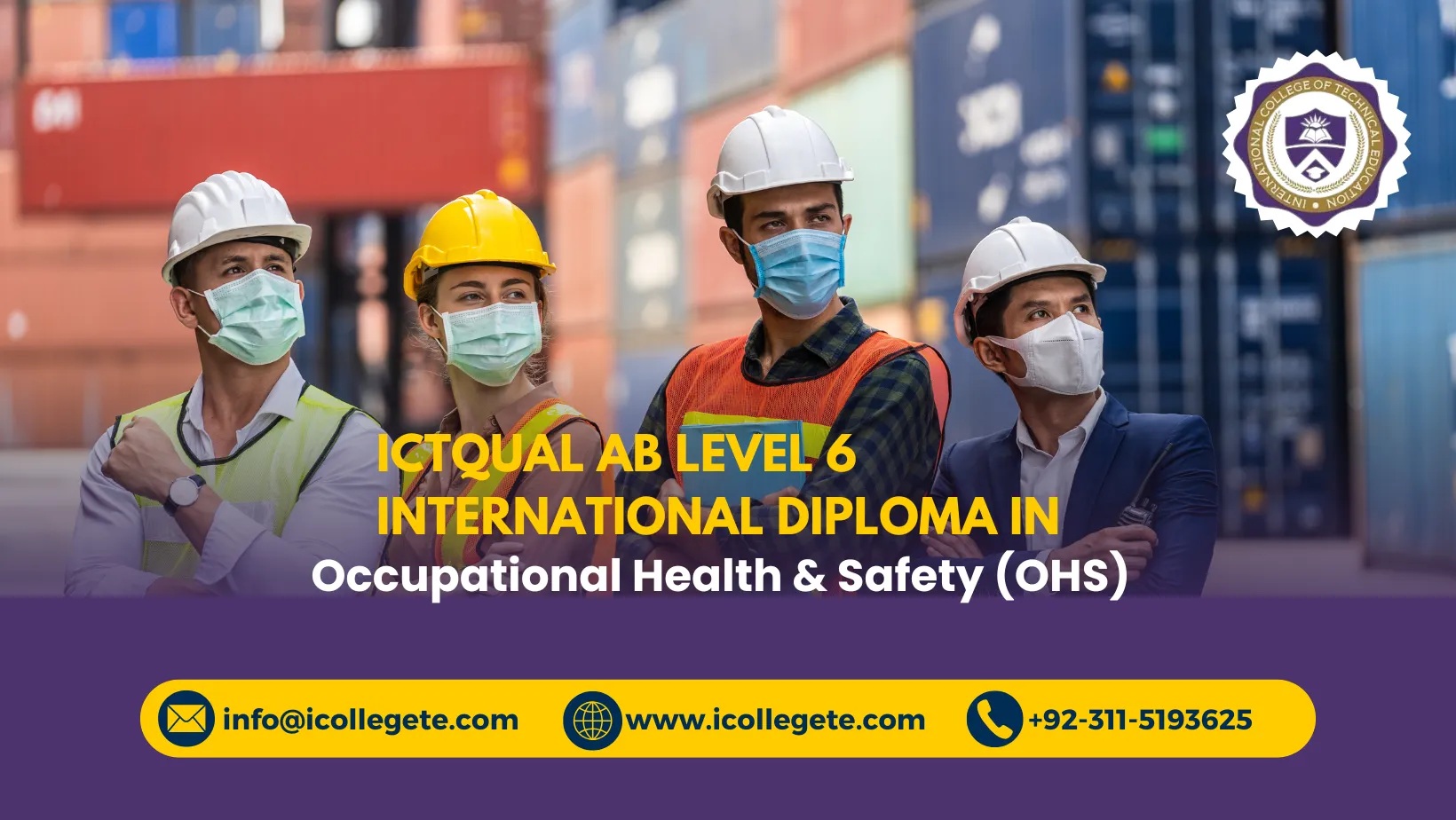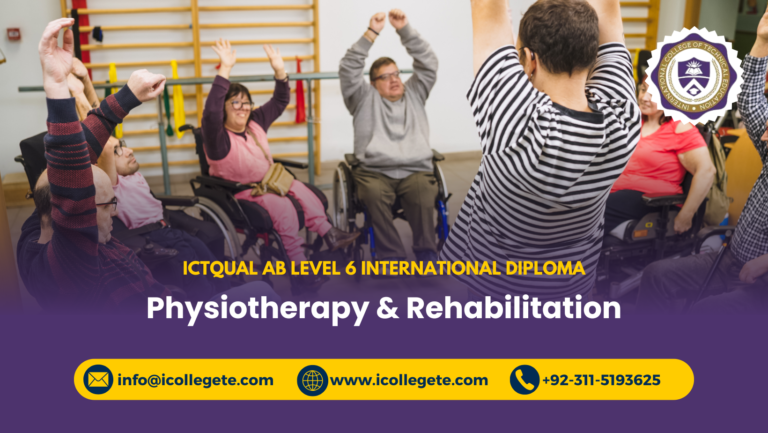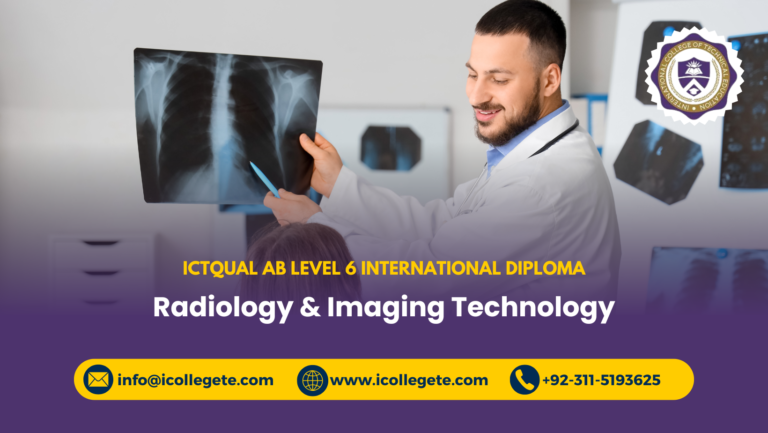The ICTQual AB Level 6 International Diploma in Occupational Health & Safety (OHS) is a globally recognized qualification designed to equip professionals with the advanced skills, knowledge, and leadership capabilities needed to ensure workplace safety and regulatory compliance across industries. ICTQual AB Level 6 International Diploma in Occupational Health & Safety (OHS) focuses on creating competent health and safety professionals capable of identifying, evaluating, and controlling workplace hazards effectively.
The ICTQual AB Level 6 International Diploma in Occupational Health & Safety (OHS) emphasizes key aspects of occupational safety management, including risk assessment, hazard prevention, environmental health, emergency response planning, and the implementation of international safety standards such as ISO 45001. ICTQual AB Level 6 International Diploma in Occupational Health & Safety (OHS) combines theoretical understanding with practical applications, preparing learners to address complex safety challenges in industrial, corporate, and construction environments.
Through ICTQual AB Level 6 International Diploma in Occupational Health & Safety (OHS), learners develop the ability to design and implement health and safety policies, conduct safety audits, investigate incidents, and promote a strong safety culture within organizations. The ICTQual AB Level 6 International Diploma in Occupational Health & Safety (OHS) also strengthens critical thinking, decision-making, and problem-solving skills that are vital for leadership roles in health and safety management.
Year 1 – Foundation of Occupational Health & Safety (OHS)
- Principles of Occupational Health & Safety Management
- International Health & Safety Legislation and Compliance
- Risk Assessment and Hazard Identification
- Accident Investigation and Incident Reporting
- Fire Safety and Emergency Preparedness
- Environmental Health & Safety (EHS) Fundamentals
- Workplace Ergonomics and Human Factors
- Safety Culture and Behavioural Safety
- Occupational Health and Industrial Hygiene
- Personal Protective Equipment (PPE) Management
- Workplace Safety Auditing and Monitoring
- Communication and Training in Health & Safety
Year 2 – Applied Occupational Health & Safety (OHS)
- Advanced Risk Management and Control Strategies
- Safety Leadership and Organizational Culture
- International Standards and ISO 45001 Implementation
- Construction and High-Risk Industry Safety
- Process Safety and Chemical Hazard Management
- Occupational Disease Prevention and Control
- Crisis and Disaster Management in the Workplace
- Transportation and Logistics Safety Management
- Contractor and Supply Chain Safety Oversight
- Sustainability and Corporate Responsibility in OHS
- Research Methods in Occupational Health & Safety
- Final Project / Professional Practice in OHS
Year 3 – Professional Competence and Specialized OHS Practice
- Strategic OHS Management and Policy Development
- Advanced Workplace Health Promotion and Well-being
- Safety Technology, Digital Tools, and Data Analytics
- Global Perspectives in Occupational Health & Safety
- Corporate Governance and Ethical Responsibilities in OHS
- Industrial Safety in Oil, Gas, and Energy Sectors
- Safety in Healthcare and Public Service Environments
- Emerging Risks and Future Trends in Workplace Safety
- Training Design and Development for OHS Professionals
- Independent Research Project in Occupational Health & Safety
- Professional Practice, Portfolio, and Competence Review
- Final Capstone Project / Dissertation
1. Understanding Occupational Health and Safety Principles
- Gain in-depth knowledge of international occupational health and safety standards and practices.
- Understand the legal and ethical responsibilities of organizations in ensuring workplace safety.
- Learn about key health and safety terminologies, frameworks, and compliance requirements.
- Develop an understanding of workplace hazards, accident causation, and control measures.
- Study international OHS legislation, including ISO 45001 and OSHA standards.
- Learn the importance of a proactive safety culture within organizations.
- Understand the impact of effective health and safety management on organizational performance.
2. Risk Assessment and Hazard Control Techniques
- Identify and assess potential workplace hazards and risks using systematic approaches.
- Learn various methods for risk evaluation and prioritization.
- Develop strategies for implementing effective risk control measures.
- Understand the hierarchy of controls and its application in real-world scenarios.
- Apply practical tools for hazard identification in different industrial settings.
- Evaluate the effectiveness of control measures to minimize workplace accidents.
- Prepare risk assessment reports in compliance with global safety standards.
3. Workplace Safety Management and Emergency Preparedness
- Learn how to design and implement comprehensive workplace safety management systems.
- Understand emergency planning, fire safety procedures, and evacuation protocols.
- Gain skills in managing crises and emergencies within an organizational context.
- Explore methods for conducting emergency response drills and safety training.
- Learn the importance of first aid and incident response coordination.
- Develop strategies for preventing and managing workplace accidents.
- Understand the role of leadership in promoting safety awareness and accountability.
4. Health and Safety Auditing and Compliance Monitoring
- Learn how to plan and conduct internal and external safety audits effectively.
- Gain insights into compliance monitoring and inspection techniques.
- Understand the process of identifying non-conformities and implementing corrective actions.
- Develop documentation and reporting skills required for audit and inspection records.
- Evaluate the performance of health and safety programs using measurable indicators.
- Learn to communicate audit findings to stakeholders effectively.
- Understand the importance of continuous improvement in health and safety systems.
5. Leadership and Communication in Occupational Safety
- Understand the significance of leadership in promoting safety culture and awareness.
- Develop effective communication skills for delivering health and safety messages.
- Learn conflict resolution and team-building techniques in safety management.
- Gain expertise in conducting safety meetings and presentations.
- Explore the role of motivation and behavior-based safety in preventing incidents.
- Learn how to engage employees in safety initiatives and awareness programs.
- Develop leadership skills for managing multidisciplinary safety teams.
6. Environmental Health and Safety Integration
- Understand the interconnection between environmental and occupational health and safety.
- Learn sustainable practices that promote eco-friendly workplace environments.
- Develop strategies to manage waste, pollution, and resource conservation.
- Study environmental impact assessments (EIA) and their relevance to safety management.
- Gain knowledge of global environmental regulations and compliance frameworks.
- Explore the integration of sustainability goals into health and safety programs.
- Understand how to balance productivity with environmental responsibility.
7. Professional Development and Career Advancement in OHS
- Learn how to pursue professional certifications in health and safety, such as NEBOSH or IOSH.
- Develop a career plan for advancing in the occupational health and safety field.
- Understand the global demand and opportunities for safety professionals.
- Gain confidence in applying for senior-level safety management positions.
- Learn to prepare professional reports, case studies, and safety documentation.
- Build a strong professional portfolio showcasing safety expertise.
- Enhance employability through globally recognized OHS qualifications and experience.
1. Globally Recognized Qualification
- Earn an internationally accredited diploma recognized across multiple industries worldwide.
- Enhance your professional credibility with a qualification respected by employers and safety institutions.
- Strengthen your eligibility for global job opportunities in Occupational Health & Safety (OHS).
- Build a solid academic foundation for further studies or professional certifications.
- Gain recognition in both public and private sector organizations.
- Demonstrate compliance with international safety standards and practices.
- Improve your professional portfolio with a UK-level qualification.
2. Career Advancement Opportunities
- Qualify for senior-level positions such as Health & Safety Officer, Safety Manager, or Risk Consultant.
- Increase your potential for promotions and higher salary brackets.
- Stand out as a competent professional in the field of workplace safety management.
- Gain leadership and management skills vital for strategic decision-making.
- Access opportunities in diverse industries including construction, oil & gas, manufacturing, and healthcare.
- Improve your professional reputation by demonstrating advanced safety management knowledge.
- Strengthen your career path toward international safety and environmental compliance roles.
3. Enhanced Practical and Technical Skills
- Develop hands-on expertise in identifying, assessing, and controlling workplace hazards.
- Learn how to conduct professional risk assessments and implement mitigation strategies.
- Gain knowledge of emergency response planning and crisis management.
- Understand modern occupational health systems and safety audit techniques.
- Master the application of safety laws, regulations, and global compliance standards.
- Learn to create effective health and safety policies and training programs.
- Strengthen your analytical and problem-solving abilities in safety management.
4. Contribution to Safer Work Environments
- Acquire the ability to promote a proactive safety culture within any organization.
- Develop leadership qualities that emphasize employee well-being and risk prevention.
- Learn strategies for reducing workplace accidents and maintaining safe operations.
- Gain confidence in implementing effective emergency and evacuation procedures.
- Build organizational resilience through proper safety planning and supervision.
- Understand psychological and behavioral factors affecting workplace safety.
- Become a key player in developing sustainable health and safety systems.
5. Strong Foundation for Further Studies and Certifications
- Qualify to progress toward Level 7 Diplomas or specialized safety management programs.
- Prepare for professional memberships in organizations like IOSH, IIRSM.
- Strengthen your academic background for future degrees in Occupational Health & Safety Management.
- Develop research and analytical skills applicable to higher academic or professional learning.
- Build confidence for international career growth and cross-industry mobility.
- Gain transferable skills valuable for managerial and leadership roles.
- Establish a lifelong learning mindset in safety, health, and risk management.
- Health & Safety Professionals – Individuals currently working as safety officers, supervisors, or coordinators who wish to enhance their qualifications and career prospects.
- Industrial Supervisors and Managers – Professionals responsible for overseeing workplace operations and ensuring compliance with safety standards.
- Engineering and Technical Staff – Engineers, technicians, and maintenance personnel involved in operations with potential safety and health risks.
- Human Resource Managers – HR professionals who manage employee welfare, workplace safety policies, and organizational compliance.
- Quality and Compliance Officers – Individuals engaged in risk assessment, quality assurance, or regulatory compliance within their organizations.
- Graduates Seeking a Career in Safety Management – Fresh graduates aiming to build a strong career foundation in occupational health and safety fields.
- Consultants and Auditors – Professionals providing occupational safety consultation, inspection, or compliance auditing services.
- Construction and Oil & Gas Workers – Personnel from high-risk industries seeking to strengthen their understanding of safety procedures and hazard control.
- Environmental Health Practitioners – Individuals focusing on the intersection of environmental safety and occupational health management.
- Professionals Transitioning to Safety Roles – Those from unrelated industries looking to switch to a rewarding and high-demand career in occupational health and safety.
- Government and NGO Employees – Officials and staff involved in implementing, monitoring, or promoting workplace safety regulations and initiatives.
- Training and Development Officers – Educators and trainers looking to gain expertise in safety management to deliver effective safety training programs.









